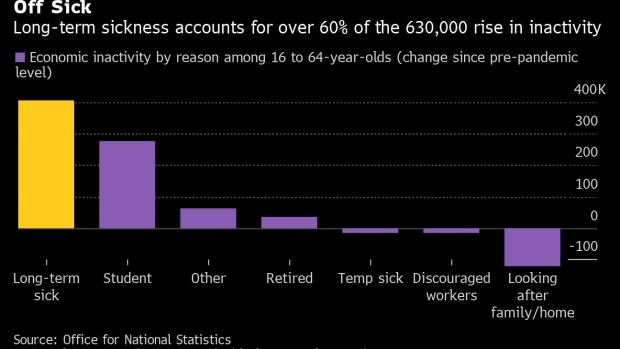Nov 30, 2022
UK Doctors Join BOE Saying Poor Health Is Hurting the Economy
, Bloomberg News

(Bloomberg) -- Doctors and the Bank of England are identifying poor health as a major drag on the UK economy in comments aimed at putting the issue on the government’s agenda.
The remarks from the British Medical Association and BOE Chief Economist Huw Pill add to growing concerns that the aftermath of the pandemic along with strains on the National Health Service are leaving more people unfit for work.
Covid-19 left millions of people fighting long-term symptoms of the disease, adding to the burden of an already overstretched NHS. The result has contributed to staff shortages that are driving up wages and inflation, leaving the UK at the bottom of the Group of Seven nations for economic performance.
“One area where economics and politics overlap is the NHS,” said Tony Yates, an independent economist and former BOE adviser. “There are a macro-economically significant number of people basically being dumped out the labor market” because of poor health. “It doesn’t make any economic sense not to do something about it.”
More than 600,000 people have dropped out of the UK labor market since the pandemic, more than 60% of whom cite long-term sickness as the reason. At least 1.8 million people in the UK -- 3% of the population -- is still experiencing long-term symptoms from the coronavirus, according to the National Institute of Health Research.
The BMA released a report on Thursday titled “The Country is Getting Sicker,” detailing the experiences of medical staff across the country and showing where the NHS is falling behind. It said government spending cuts and the erosion of government policies tackling issues from smoking to obesity are to blame along with inflation, which is forcing millions of people to choose between heating their homes and eating properly.
“Doctors are struggling to pick up the pieces of government failures,” said BMA President Martin McKee. “Too many people simply don’t know if their families will have money, food or shelter from one week to the next and doctors are left feeling helpless in the face of ever-increasing levels of ill-health.”
Pill, the BOE economist, said at a conference on Wednesday that one of the BOE’s biggest concerns is how much the workforce has shrunk since the pandemic -- a phenomenon that’s largely been driven by older workers leaving the labor market and an increase in chronic health issues.
“People in the 50-65 age group, relative to pre-Covid levels, have a higher level of inactivity -- are not in a job and not looking for work,” Pill said, suggesting it’s out of the BOE’s hands to fix the issue. “Our job would be easier, and the health of UK economy would be better if those supply-side factors were dealt with in an appropriate way.”
The government has invested £50 million ($60 million) into research on long-Covid symptoms, with a further £70 million pledged toward expanding treatment for those suffering and another £30 million for primary care at GP surgeries. Yet these sums pale in comparison to the £8.3 billion that was spent on the Covid-19 vaccine program, according to a report by the National Audit Office published earlier this year.
Inflation is cutting in on the NHS budget, leaving nurses and ambulance staff threatening to strike over pay. Meanwhile, patient waiting times and health outcomes are deteriorating due to under-staffing at hospitals and GP surgeries.
“Doctors will not stand by while the people they treat suffer needlessly from a broken system,” McKee said. “Today we are raising the alarm.”
©2022 Bloomberg L.P.


